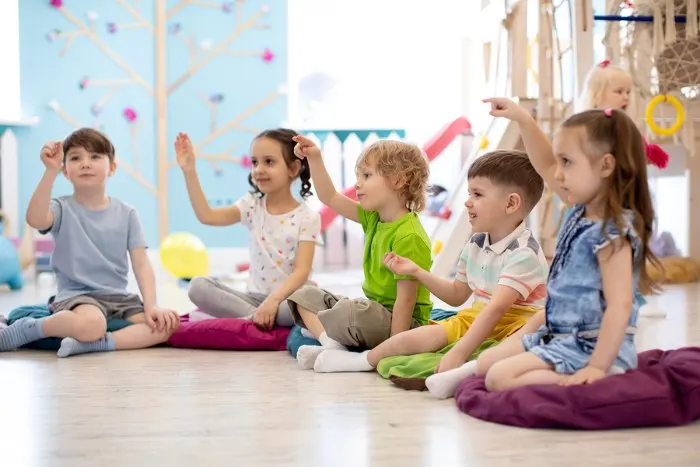Listening skills are paramount at any stage of life, but they hold special significance during the formative years. As toddlers and preschoolers are in the midst of developing their language and communication abilities, listening becomes a cornerstone of their learning journey. Daily interactions offer a golden opportunity to instill these skills. By exemplifying attentive listening through actions like maintaining eye contact, giving undivided attention, and showcasing respectful body language, we can set a strong foundation. Children, being the keen observers they are, quickly emulate these behaviors.
Listening isn’t just a fleeting phase of childhood; it’s a lifelong skill that influences our relationships, professional lives, and overall well-being. For our little ones, honing their listening skills can be a delightful experience. Engaging games, such as the ones highlighted below, not only entertain but also educate.
NAME THAT NOISE
A game that sharpens the auditory senses, ‘Name That Noise’ is all about identifying sounds from the environment.
- Setup and Play:
Encourage children to either close their eyes or use a blindfold. Create various sounds using everyday objects or actions, like shutting a door, dropping a book, or flipping a light switch. The challenge for the kids is to recognize and name the sound they just heard. - Benefits:
This game enhances auditory discrimination skills. It teaches children to focus on subtle differences in sounds, which is crucial for language development and comprehension.
I SPY
‘I Spy’ is a timeless game that combines listening with observation, making it a favorite among kids and adults alike.
- Setup and Play:
Begin by giving children three clues about an object in their vicinity. For instance, if you’re thinking of a ball, you might say, “I spy something round, filled with air, and bouncy.” The goal is for the kids to guess the object based on your description. Take turns so that everyone gets a chance to be both the describer and the guesser. - Benefits:
‘I Spy’ not only refines listening skills but also encourages children to pay attention to details. It fosters vocabulary expansion and descriptive language use.
STORYTIME FOLLOW-UP
Stories captivate the imagination, and ‘Story Time Follow-Up’ ensures that children are not just hearing, but truly listening to the tales being told.
- Setup and Play:
Choose a beloved storybook and read it aloud. Once done, engage the children with questions about the narrative. What transpired at the beginning, middle, or end? Encourage them to illustrate a scene or character from the story. For an added twist, ask them to concoct an alternative ending and discuss how it compares to the original. - Benefits:
This activity promotes active listening and comprehension. Drawing aspects of the story boosts memory retention while crafting alternative endings nurtures creativity..
MONKEY HEAR, MONKEY DO
‘Monkey Hear, Monkey Do’ is a rhythmic game that challenges children to replicate sound patterns, making it both fun and educational.
- Setup and Play:
Using everyday items like blocks, spoons, or pencils, create a sequence of sounds by tapping or banging them. The children’s task is to listen keenly and then reproduce the exact sequence. Start with simpler patterns and gradually increase the complexity as they get the hang of it. - Benefits:
This game is excellent for enhancing auditory memory and sequential processing. It also aids in developing a child’s concentration and attention to detail.
SIMON SAYS
A classic that never gets old, ‘Simon Says’ is a delightful way to teach children the importance of attentive listening and quick response.
- Setup and Play:
The rules are simple. When the leader (Simon) gives a command starting with “Simon says,” everyone must follow it. However, if a command is given without the “Simon says” prefix, anyone who follows it is out. The trick is to listen carefully and react only to the correct commands. - Benefits:
‘Simon Says’ not only sharpens listening skills but also tests reflexes and the ability to distinguish between valid and invalid commands. It’s a great way to teach children the importance of discernment.
FAQ
1. Why is it important to start teaching listening skills at a preschool age?
Preschool age is a critical developmental period where foundational skills are established. Introducing listening skills early sets the stage for effective communication and comprehension in later academic and social settings.
2. How can parents reinforce listening skills at home?
Parents can engage in interactive storytelling, play listening games, and consistently practice active listening themselves, demonstrating its importance. Regularly conversing with the child and asking open-ended questions can also bolster these skills.
3. Are there any apps or online resources for preschool listening games?
Yes, there are numerous educational apps and websites dedicated to enhancing listening skills for preschoolers. Some popular ones include ‘Listening and Attention’, ‘HearBuilder’, and ‘Funbrain Jr.’
4. How do I gauge the improvement in my child’s listening skills?
Look for signs like better comprehension of instructions, increased attention span during conversations or storytelling, and the ability to recall and act on what was said.
5. Can music and dance activities help in improving listening skills?
Absolutely! Music and dance require children to listen to rhythms, lyrics, and instructions, making them excellent tools for honing listening skills.
Final Words
In the vibrant tapestry of skills that children weave in their early years, listening stands out as a golden thread. It’s not just about hearing words but understanding, empathizing, and responding. As caregivers, educators, and parents, our role is to ensure that this skill is nurtured, celebrated, and integrated into their daily lives. Through fun games and consistent practice, we can gift our children the magic of listening, a gift that will illuminate their paths forever.
